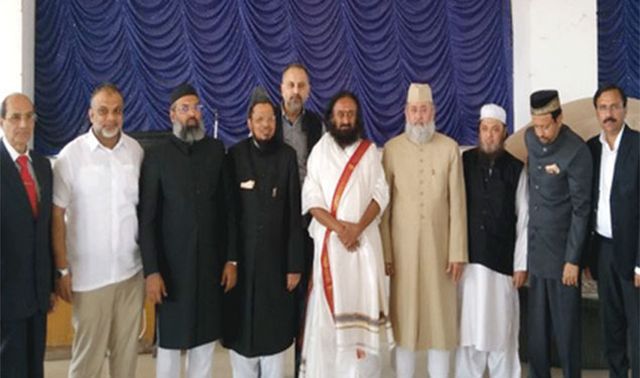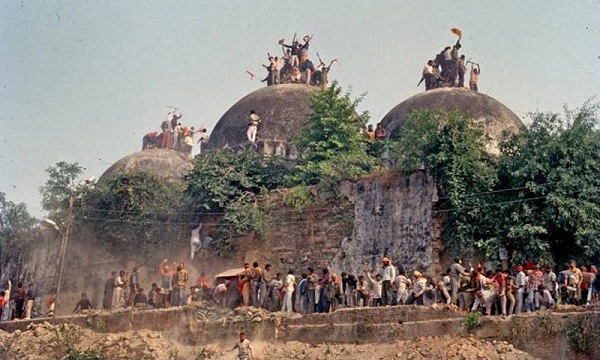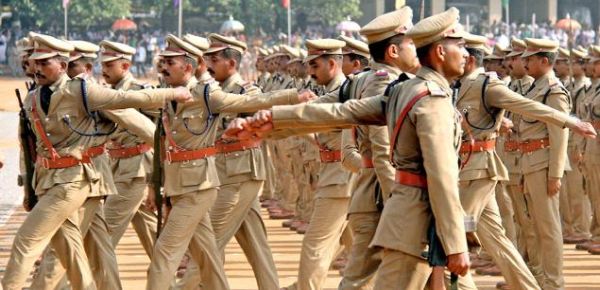
by admin | May 25, 2021 | News, Politics

Salim Khan
Mumbai : Veteran screenwriter Salim Khan on Thursday told Maulana Salman Hussaini Nadvi, who favoured handing over the disputed land in Ayodhya where the Babri Masjid once stood for the construction of the Ram temple, that the eminent cleric being a part of the All India Muslim Personal Law Board (AIMPLB) was a liability.
“Salman Nadwi sahab, whether the AIMPLB asked you to step down or you quit, it was a blessing in disguise, as being part of the committee was anyway a liability. Please look up incidents in history where any change has been brought about by one person and not by any party or committee,” Salim tweeted on Thursday.
“Mahatma Gandhi, Nelson Mandela, Jesus Christ and Gautam Buddha to name a few. You have started a movement which has a lot of followers and is growing. Also please note this world has more peace lovers than destructive people and that is why the world has survived. Love each other or perish,” he added.
Salim’s tweet comes after a general body meeting on February 10-11, where over 500 people participated and an unanimous decision was made to remove Nadvi from the Board.
Nadvi had triggered a row on the eve of the plenary by mooting a proposal after his meeting with Sri Sri Ravishankar that the disputed land in Ayodhya, where the Babri Masjid stood till December 1992, should be handed over for the construction of the Ram temple.
—IANS

by admin | May 25, 2021 | News, Politics
 Hyderabad : The AIMPLB, an apex body of Indian Muslims, is likely to expel its executive member, Maulana Syed Salman Hussaini Nadvi, for favouring handing over disputed land in Ayodhya, where Babri Masjid once stood, for the construction of Ram temple.
Hyderabad : The AIMPLB, an apex body of Indian Muslims, is likely to expel its executive member, Maulana Syed Salman Hussaini Nadvi, for favouring handing over disputed land in Ayodhya, where Babri Masjid once stood, for the construction of Ram temple.
Taking strong exception to the proposal, the All India Muslim Personal Law Board (AIMPLB) has formed a four-member committee to take disciplinary action against Nadvi, an eminent cleric who mooted the proposal during a meeting with spiritual leader Sri Sri Ravi Shankar.
The committee comprises AIMPLB President Rabey Hasani Nadvi, General Secretary Wali Rahmani and executive members Arshad Madani and Khalid Saifullah Rahmani and it is expected to take a decision on Sunday.
The deliberations at the three-day crucial plenary, which began here Friday, were dominated by the controversy.
Sources in AIMPLB said Salman Nadvi, who teaches at Darul Uloom Nadwatul Ulama, a leading seminary in Lucknow, may be expelled from the board for not only taking a stand in contravention of its traditional stand on Babri Masjid but also making allegations against the board’s leadership.
With the executive meeting on Friday pulling up Nadvi for his proposal, he stayed away from the plenary meeting on the second day and reportedly left Hyderabad. Earlier, talking to reporters, he alleged that two executive members Kamal Farooqi and S.Q.R. Ilyas humiliated him.
Salman Nadvi defended his formula saying this would ensure peace and communal harmony. He alleged that there is dictatorship in the board and few people are controlling it.
Talking to IANS on Saturday, Ilyas denied the allegations made by Salman Nadvi against him. “I initiated the discussion but all those who spoke opposed the proposal as it is the well-known stand of the board that the land of mosque can’t be sold, gifted or alienated. This is an attempt to malign the board,” he said.
Ilyas, who is convenor of the Babri Masjid committee of the board, said Nadvi should have raised any issue in the AIMPLB meeting before speaking publicly. He said Nadvi’s action had damaged the board’s reputation at a time when it is holding a crucial meeting here to discuss various important issues.
“If anybody has any issue, he may discuss it in the board. You can’t go and talk on behalf of the board. Mr Salman Nadvi is not an ordinary person. He is the executive member of the board. If he doesn’t agree with the board, let him resign and then do whatever he wants,” said Ilyas.
He also said that if the board failed to take action against Salman Nadvi, it would damage the image of the board.
Some members and special invitees, who did not want to be named, see a conspiracy behind Salman Nadvi’s proposal to create a divide in the board, which is a united platform of all Islamic schools of thought. They said he proposed the formula on the eve of the plenary to create confusion.
The board leaders held no media briefing of the deliberations on Saturday. However, a decision on Salman Nadvi is expected to be announced on Sunday, when the plenary will conclude with the passing of Hyderabad Declaration and a massive public meeting.
After the executive committee meeting on Friday night, the Board issued a statement to rule out compromise on the land in Ayodhya in Uttar Pradesh, on which the Babri Masjid stood before it was demolished by a mob December 6, 1992.A
The AIMPLB said that when a mosque is constructed, it remains a mosque always and it can’t be sold, exchanged, or alienated in any manner. It also said it will abide by the Supreme Court order, which is presently hearing the case.
—IANS

by admin | May 25, 2021 | News, Politics

Justice Dipak Misra.
New Delhi : The Supreme Court on Thursday said it will deal with the Ramjanmabhoomi-Babri Masjid case as a pure land dispute and refused to hear it on a day-to-day basis.
Meanwhile, the All India Muslim Personal Law Board (AIMPLB), which is beginning a crucial three-day plenary in Hyderabad on Friday, demanded contempt of court proceedings against those speaking of building a Ram temple at the site of the razed Babri Masjid in Ayodhya.
Beginning the hearing, a special bench of Chief Justice Dipak Misra, Justice Ashok Bhushan and Justice S. Abdul Nazeer posted it for March 14, asking parties in the case to file English translations of the documents before it.
After senior advocate Rajeev Dhavan, appearing for one of the petitioners, sought day-to-day hearings, the bench refused saying: “Over 700 poor litigants are waiting for justice, we have to hear them.”
The court also said it will hear at later stage the impleadment applications of those which were not before the Allahabad High Court.
The court was hearing a batch of cross petitions challenging the 2010 Allahabad High Court verdict that had divided, in by a 2:1 majority, the disputed Babri Masjid-Ramjanambhoomi site between the Nirmohi Akhara, Lord Ram deity and the Sunni Waqf Board.
Additional Solicitor General Tushar Mehta, appearing for the Uttar Pradesh government, told the court that 504 exhibits, including books such as the Ram Charit Manas, Ramayana and Bhagawat Gita, written in various languages, have been translated and filed in the court.
The depositions of 87 witnesses have also been filed along with the Archaeological Survey of India’s reports as well as photographs. However, some translations are yet to be completed, he added.
The top court was moved challenging the High Court verdict by petitioners M. Siddiqui, represented by his legal heirs, the Nirmohi Akhara, the UP Sunni Central Waqf Board, Bhagwan Shri Ram Virajman, All India Hindu Mahasabha’s Swami Chakrapani, the Akhil Bharat Hindu Mahasabha, the Akhil Bharatiya Sri Ramjanam Bhoomi Punardhar Samiti and others.
Addressing reporters ahead of the AIMPLB meet, its spokesman Maulana Sajaad Nomani said those speaking of building a grand Ram temple at the site represented a “clear case of contempt of court” and that the court and the government should take action.
He said the Board would present its case before the Supreme Court and abide by its verdict.
—IANS

by admin | May 25, 2021 | Opinions
 By Saurabh Katkurwar
By Saurabh Katkurwar
Locals, both Hindus and Muslims, say they were “outsiders” who came to Ayodhya in 1992 and stirred trouble while locals were busy saving each other – irrespective of their religious faiths – from the brunt of the riots that ensued.
Ayodhya : As India approaches 25 years of the apocalyptic demolition of the 16th century Babri Masjid on December 6, citizens of Ayodhya take pains to talk about their age-old heritage of cultural collaboration and free participation in inter-religious activities which has kept the secular fabric of the twin intact – despite the dragging temple-mosque politico-legal dispute over 2.7 acres of prime land whose ownership is contested by both Hindus and Muslims.
Locals, both Hindus and Muslims, say they were “outsiders” who came to Ayodhya in 1992 and stirred trouble while locals were busy saving each other – irrespective of their religious faiths – from the brunt of the riots that ensued. Out of the town’s total population of around 60,000, Muslims account for only six per cent. But they never felt any discrimination from Hindus, says Mohammed Chand Qaziana, priest at the Dargah of Sayyed Mohammad Ibrahim.
Qaziana said that the dargah was protected by local Hindus when the kar sevaks, or Hindu religious activists who came from outside the town, demolished the Babri mosque on December 6, 1992, on the ground that it was erected there by invading Mughal emperor Babar after razing a temple dedicated to Ram, the revered warrior-god of Hindus.
“This 900-year-old dargah has followers from the Hindu community as well, many of whom regularly pay a visit here. It is a symbol of our centuries-old harmonious existence. When it was attacked, our Hindu brothers formed a human shield around it and saved it,” Qaziana recalled to IANS.
Faizabad district, in which Ayodhya falls, has about 30 per cent Muslim population. Qaziana said there is an unannounced understanding among the people here not to fall prey to hate speeches of politicians and outsiders.
What makes communal harmony special here is the participation in inter-faith events and rituals – Muslims stitching clothes for Hindu deities, participating in Ramleela (religious theatre based on the life of Ram) or doing namaz (prayers) in Hindu religious places; and Hindus similarly contributing to mosque renovation or helping Muslim fellow townspeople in times of need.
Echoing Qaziana’s views, Barfi Maharaj, who identifies himself as a Hindu social worker, said the Masjid was razed on December 6 by Vishwa Hindu Parishad (VHP) hotheads and locals had no role in it.
“We were neither influenced by hate speeches nor did we participate in the demolition drive. It was VHP that brought outsiders to demolish the Masjid. How can people from the birthplace of Ram, who is known for his secular teachings, commit such a sinful act?” asked Barfi Maharaj.
Giving examples of inter-faith harmony in the town, he said that a mosque near Hanumangadhi in Ayodhya was being renovated by a Hindu mahant (priest) while a Muslim tailor had been stitching clothes for the idol of Ram that is installed in the makeshift temple at the disputed site of Babri Masjid.
Needless to say, whatever be the difficulties and complexities in the Mandir-Masjid issue, there will not be any negative impact in the socio-religious fabric of the city, feel the people of Ayodhya, once the kingdom of Ram, known for being a model of good governance in that era.
(This feature is part of a special series that seeks to bring unique and extraordinary stories of ordinary people, groups and communities from across a diverse, plural and inclusive India, and has been made possible by a collaboration between IANS and the Frank Islam Foundation. Saurabh Katkurwar can be contacted at saurabh.k@ians.in)

by admin | May 25, 2021 | News, Politics
 Lucknow : Heavy security has been deployed across Uttar Pradesh, including Faizabad and Ayodhya, on the 25th anniversary of the demolition of the disputed Babri Masjid structure, police said.
Lucknow : Heavy security has been deployed across Uttar Pradesh, including Faizabad and Ayodhya, on the 25th anniversary of the demolition of the disputed Babri Masjid structure, police said.
Twenty seven additional companies of the provincial armed constabulary (PAC) have been deployed across the state.
Of these, six companies each have been deployed in the state capital and in Faizabad district, specially to keep vigil on the temple town of Ayodhya.
Ayodhya has been divided into four zones and ten sectors and prohibitory orders under section 144 have been clamped. Any form of protests, demonstrations have been completely banned.
While the Vishwa Hindu Parishad (VHP) has been celebrating the 1992 demolition of the Babri mosque as ‘Shaurya Diwas’, some Muslim organisations observe it as a black day.
All fire cracker shops have been asked to shut down and vigil has been stepped up around liquor vends as well.
Orders have also been issued to check roof tops, which in Uttar Pradesh are often used to stockpile stones and bricks to be used during communal clashes.
Director General of Police (DGP) Sulkhan Singh has asked the district police chiefs to step up vigil and keep a tab on elements who could try to foment trouble.
He also directed officials to clamp prohibitory orders if situation arises. There were intelligence inputs that some mischievous elements and various terrorist outfits might try to disrupt peace on the day.
Police deployed on duty has been asked to carry with them riot gears including helmets, body protectors, tear gas shells, rubber bullet guns for any emergency.
—IANS





